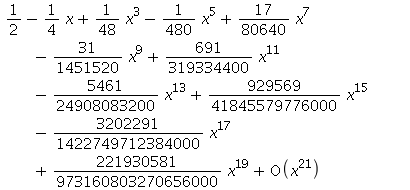Let $D:f\mapsto f'$. Then $$A(f)_x=f(x)+f(x)+f'(x)+1/2f''(x)+\cdots=(I+e^D)(f)_x.$$ Then $A^{-1}=(I+e^D)^{-1}$. Suppose that $f$ is a polynomial of degree $20$. Then our preferred computer calculates the Taylor's development of $\dfrac{1}{e^x+1}$ until $O(x^{21})$.
and we are done.
For example, $f(x)=x^3$; $A^{-1}(f)=(1/2I-1/4D+1/48D^3)(f)$, that is, $1/2x^3-3/4x^2+1/8$.
EDIT. In fact, $\dfrac{1}{e^x+1}=1/2(1-\tanh(x/2))$. Then the coefficients of its Taylor' development are functions of Bernouilli's numbers cf.
https://en.wikipedia.org/wiki/Bernoulli_number
Then there exists a recurrence linking the successive coefficients.

